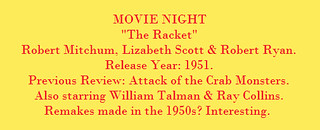
Review #1008: The Racket.
Cast:
Robert Mitchum (Captain Thomas McQuigg), Lizabeth Scott (Irene Hayes), Robert Ryan (Nick Scanlon), William Talman (Officer Bob Johnson), Ray Collins (District Attorney Mortimer X. Welch), Joyce MacKenzie (Mary McQuigg), Robert Hutton (Dave Ames), Virginia Huston (Lucy Johnson), and William Conrad (Detective Sergeant Turk) Directed by John Cromwell.
Review:
When I reviewed the original 1928 version of The Racket (#901), I described it as an efficient film that ran at a fine pace that pushed the right buttons and served its purpose as a crime drama that had originally served as a stage play the previous year. In any case, it is interesting reviewing the remake that was made just two decades later, with the man who had starred as McQuigg in the original Broadway production serving as director. In any case, this is a movie that isn't much of an improvement on the original, though it is also a movie that is at best moderately satisfying to the standard of film noir crime drama that you might expect. The best thing about the movie is the scenes involving Mitchum and Ryan, such as their first scene together, when the latter ends up having to deal with his brother's involvement with a singer and an ensuing conversation about his care for him - along with dialogue about how the other will try to pull one over the other. There isn't much going for the film that you could already see in other gangster films (or even the original version), and the characters themselves aren't really all too interesting. Sure, Mitchum and Ryan pull off fine performances, and the rest of the cast are fairly decent, but they can't really elevate these characters to anything too special or compelling, although Conrad is certainly interesting to watch even when in the background. It seems to hint at something more with the corruption element, but it never really comes off as anything too revealing nor does it seem like it wants to say something more relevant than what you might expect. Oddly, though Cromwell is the only credited director, four other directors directed supplemental scenes in the film due to re-shoots ordered by Howard Hughes (owner of the studio that released the film, RKO Radio Pictures): Nicholas Ray (director of Rebel Without a Cause (#181) and Bigger Than Life (#928), Tay Garnett (director of films such as the 1946 version of The Postman Always Rings Twice), Sherman Todd (who also served as editor of the film) and Mel Ferrer (actor/director). Notable scenes that Ray directed include the beginning scene with the the Crime Commission, a police locker sequence, and other bits and pieces.
At 88 minutes, it's not exactly a slog of a film to go through, and it is a movie that is on a basic level entertaining, but it's really hard to recommend this film over other films (The Big Combo (#934), He Walked by Night (#947), or the 1928 original). On a grading scale, this would fall along a C level, but I can't blame someone for finding it useful to watch at least once. It's a mess, but it is a fine mess that shines in all sorts of directions for everyone, for better or for worse, being a pretty good example of a toss-up.
Overall, I give it 6 out of 10 stars.

No comments:
Post a Comment